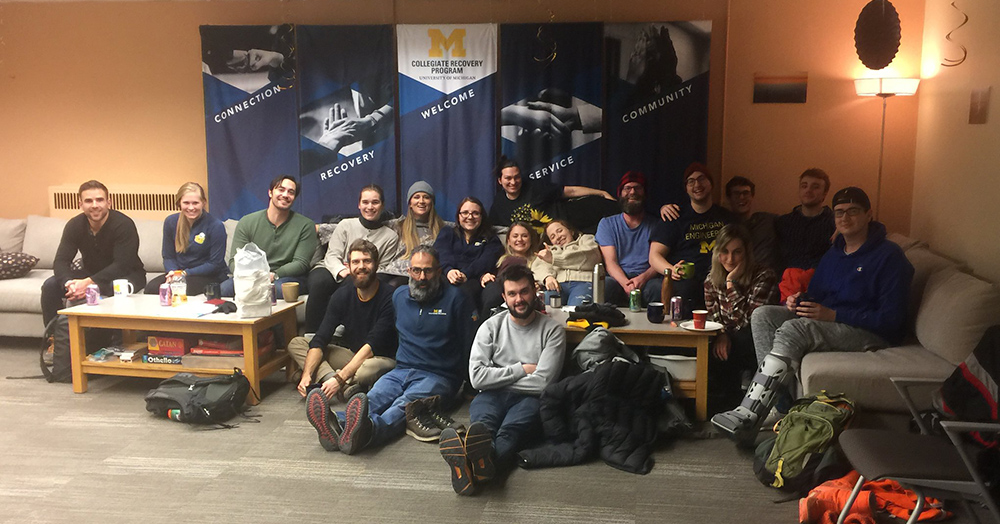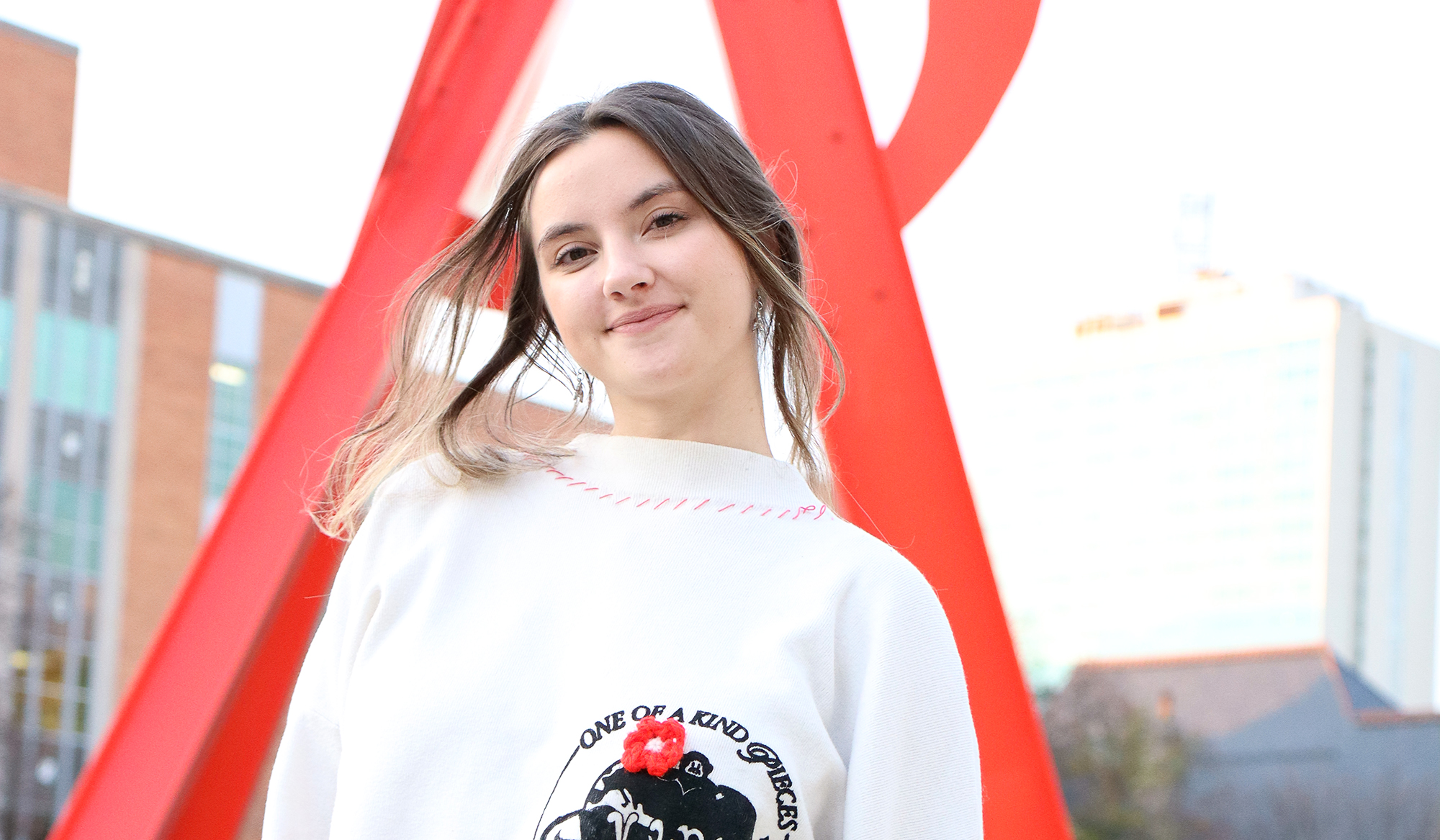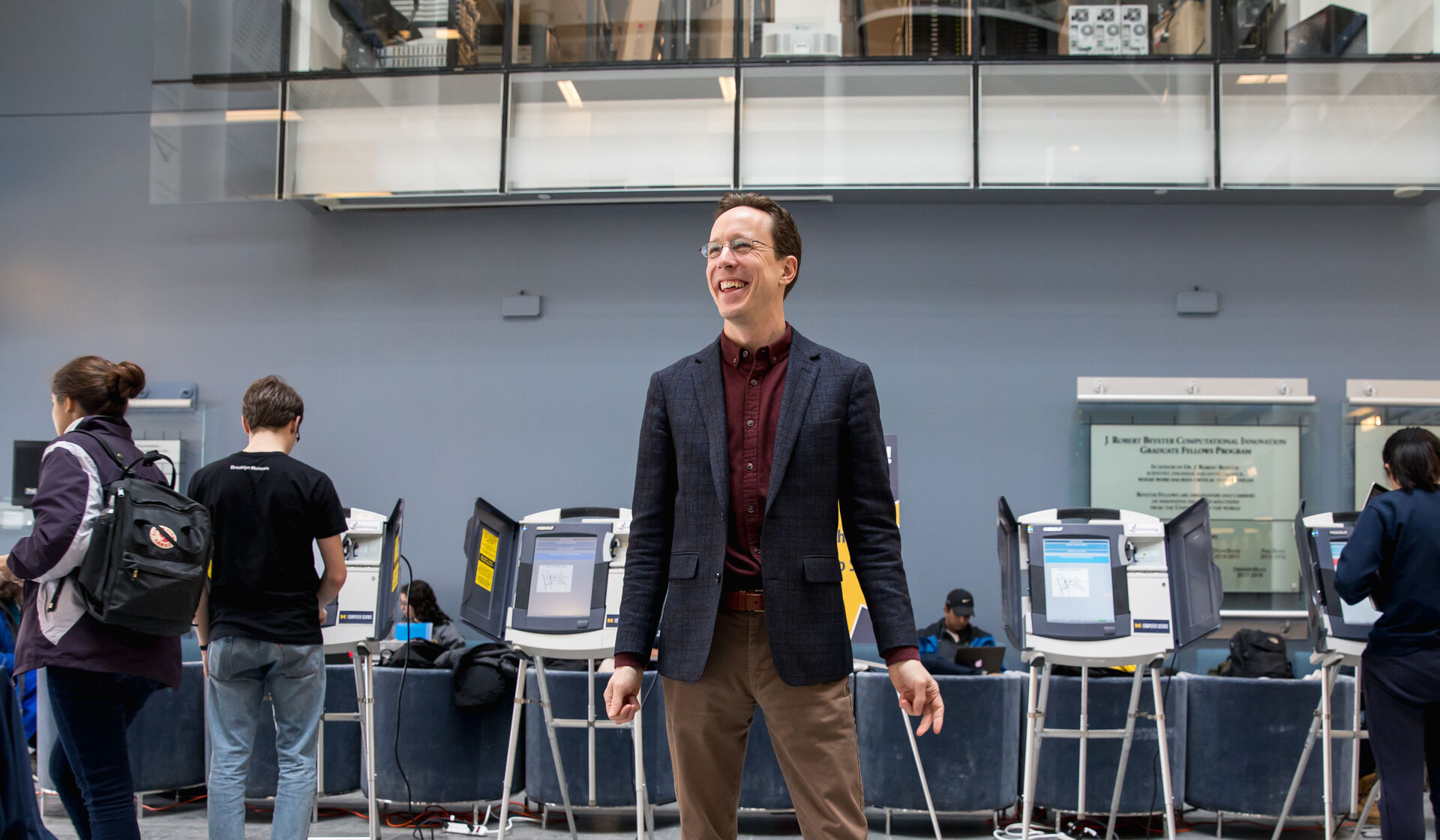On April 23, the Alumni Center hosted a special graduation with nearly 100 people in attendance. Unlike the Big House ceremony, celebrating thousands of students, this one had only eight graduates. All were matriculating not just from the University, but from U-M’s Collegiate Recovery Program (CRP), which provides students in recovery due to substance use disorders with a support community. Kathryn Farquhar, ’13, one of the original students who helped found CRP at U-M in 2011, delivered the keynote address.
“I remember when this program had just one couch in the hallway,” she said, praising the Jake Goldberg Recovery Lounge, which opened in October 2018. Housed in the basement of the University Health Service building, it is now the headquarters for CRP, providing an area for the students to study, play board games, watch TV, or simply get away from the social life on campus. What’s more, CRP students have 24-hour access to the room.
“Jake would have loved that lounge,” Farquhar said, before looking at Jake’s parents, Amy Lazarus and Gene Goldberg, and tearfully adding, “I know there is no freedom from the pain and heartbreak of loss.”
In January 2018, Jake died of addiction.
For Lazarus and Goldberg, who held a memorial for their son at the Michigan League in the fall of 2018 that some 200 people attended, the lounge—funded by donations from family and friends—was a long-needed gift. As a member of the first CRP cohort, Jake and his class had only a small room for socializing at UHS, yet he could often be found there.
U-M’s CRP program is not unique. More than 150 CRP programs now exist across the country to help students achieve academic success while enjoying a genuine college experience, free of alcohol and other drugs. U-M was the first program in the Big Ten to join the nationwide CRP community.
“There is a myth out there that you can’t be an alcoholic in college,” says Matt Statman, MSW’10, the program manager of CRP, which operates under the University Health Service’s Wolverine Wellness initiative. “About 10% of people have a predisposition for alcoholism, so students often discover they have a problem in college. But they can’t imagine life without drinking when it is such a large part of the culture.” Statman, who is also in recovery and has been sober since 2002, makes himself available to the CRP students 24/7.
CRP is not a clinical treatment or therapy program, but a support service for those already in recovery. Students who need treatment are either referred elsewhere before admittance to CRP or may be in outpatient treatment while attending CRP. The community—which in any given semester averages around 25 students—meets twice weekly and organizes sober events: ice skating, trips to northern Michigan, and a sober tailgate courtesy of U-M Regent Mark Bernstein, ’93, JD’96, MBA’96, who lends his reserved spot near Michigan Stadium.
“All of our programming is designed to help students maintain a supportive, on-campus community where they can build relationships that support their recovery,” says Statman.
Sitting in the audience at the graduation, demonstrating their unwavering support for the CRP program, were family, friends, and an impressive guest list from U-M. It included three U-M regents—Mark Bernstein, Denise Ilitch ’77, and Paul Brown, ’96, MBA’08—as well as the vice president for Student Life, E. Royster Harper, ’73, MA’74, and the executive director of the University Health Service, Robert Ernst, MD’91, who also serves as the associate vice president for Health and Wellness in Student Life.
Ilitch also addressed the graduates. “I lost my brother to addiction a year ago,” she said of Ronald Ilitch, who died in February 2018. “I felt like I lost my arm when he died. He struggled and worked so hard his whole life to fight it. I know it takes work and courage. I applaud you. If there is anything I can do to support you, let me know.”
“The students in CRP teach me lessons about resiliency, compassion, and solidarity,” says Bernstein. “Lessons that are inspiring and profoundly moving.”
Harper agrees. “The students care for and hold each other accountable with courageous honesty and selfless compassion. I am always humbled by their examples and proud of their accomplishments.”
Mary Jo Desprez, the director of Wolverine Wellness, is hoping to expand the scholarship funding and social support programming for CRP’s growing membership. “It’s a uniquely transformative program on campus.”
At the ceremony, graduates openly shared their journeys to sobriety and a U-M degree. One student’s path to graduation had been particularly long. “It took me 17 years at six different colleges to graduate. I was always trying to get over the same wall,” explained Zac Howard, who lost both his parents as a child. “It was only when I came to U-M and found CRP that I saw the value in not trying to beat my addiction on my own. I have now been sober for 13 months tomorrow.” This fall, he will enter a master’s program in U-M’s School of Social Work with CRP’s continuing support.
In Jake’s memory, a scholarship bearing his name has been established with a $500,000 endowment by the family foundation of James Dondero, a philanthropist who runs an investment firm. Though Dondero never knew Jake, he heard his story and wanted to support CRP. This fall, the first CRP student will benefit from that scholarship.
Lazarus recalls the difficult days Jake faced after U-M. “Jake was socially at a loss working in Detroit. AA does not fill the gap of a peer group when you are in recovery,” says Lazarus, who is now helping to promote BigVision.nyc, a program for young adults in recovery she hopes will become national. “At the end, Jake felt very lonely and isolated. CRP got him through college, but then he graduated.”
How It Helps
A recent survey asked CPR students how the program had affected their college experience. Here are a handful of their responses.
“Even with 12-step groups, I honestly don’t think I would’ve been able to stay sober at U-M without CRP. I felt very isolated coming back to campus as a person in recovery and the thought of staying sober in school was daunting and overwhelming.”
“It helped me learn to be social without drugs, gave me an open space to talk about my struggles, and showed me that it is possible to do both.”
“Many of my closest friends are people I’ve met in CRP. It has given me a place where I can be myself and have fun. It has been crucial to my overall happiness and wellbeing, which in turn allows me to perform better as a student.
“I’ve met so many other likeminded friends who can relate to the powerlessness of drinking and using drugs.”
“CRP has been a wonderful part of my college experience. I am a continuing student and I have met some very courageous and ambitious student/good friends, who have supported me through tough times and helped keep me sober through graduate school.”
“There is nowhere else one can go where people can relate to being students and members of recovery. It allows me to be myself, and to be completely open, somewhere on campus.”
Jennifer Conlin, ’83, is the deputy editor of Michigan Alumnus.





